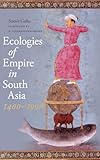Ecologies of empire in South Asia, 1400-1900 / Sumit Guha.
Material type: TextSeries: Culture, place, and naturePublication details: Ranikhet ; Permanent Black, 2023.Description: xvi, 243 pages ; 24 cmISBN:
TextSeries: Culture, place, and naturePublication details: Ranikhet ; Permanent Black, 2023.Description: xvi, 243 pages ; 24 cmISBN: - 9780295751481
- 9780295751498
- 9788178246772
- 304.2095409 GUH
| Item type | Home library | Collection | Call number | Status | Date due | Barcode |
|---|---|---|---|---|---|---|
| Books | ATREE Library General Stacks | Non-fiction | 304.2095409 GUH (Browse shelf(Opens below)) | Available | 5890 |
Browsing ATREE Library shelves, Shelving location: General Stacks Close shelf browser (Hides shelf browser)

|

|

|

|

|

|

|
||
| 304.20954 RAN Shifting ground : people, animals, and mobility in India's environmental history / | 304.20954 RAN Nature and nation : essays on environmental history / | 304.20954 SHA Caste and nature : Dalits and Indian environmental politics / | 304.2095409 GUH Ecologies of empire in South Asia, 1400-1900 / | 304.2095414 LAH Dancing with the river : | 304.2095496 GUN Culture and the environment in the Himalaya / | 304.2095496 KRI Conservation landscapes and human well-being : sustainable development in the Eastern Himalayas / |
Inequality, complexity, and ecology -- South Asia in the imperial gaze -- Imperial gaze, lordly grasp -- The village and its inhabitants -- Lands of resistance, terrains of refuge -- Colonialism, disarmament, and the closing of the forest frontier.
"By focusing on the human gaze, or how people interpret their relationship with land, Sumit Guha traces the longue durée of the political ecology of empire in South Asia during the age of empires. This relationship is in most sharp relief when comparing the exploitative and extractive practices of the Mughal Empire and the industrial British Raj as these imperial regimes encountered a large and old agrarian society. While scholars of South Asia regularly dwell on the destructive nature of British policies in South Asia, Guha integrates the cultural turn in environmental studies with the complex imperial rivalries that defined South Asia from the fifteenth through the mid-twentieth century to demonstrate how land use is defined through matrices of competing geographic expertise, too often in service of distant courts and environmental degradation"--


There are no comments on this title.